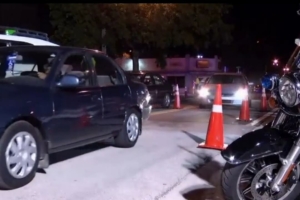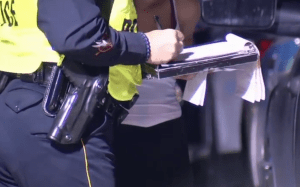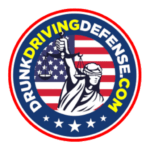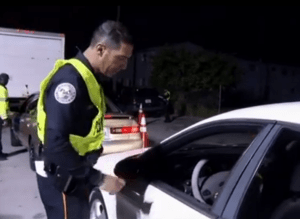DUI Checkpoints – Sobriety Checkpoints

If you were stopped at a DUI checkpoint and arrested for driving under the influence, all is not lost. An arrest is not a conviction™! Consult FREE right now with one of the country’s leading DUI attorneys in your area. Hire a DUI lawyer who knows how to attack police checkpoints, which can result in a total dismissal of all charges…even if it was a felony offense.
![DUI Checkpoints Near Me]() Caught by the Chase Car?
Caught by the Chase Car?
Virtually every DWI checkpoint has a police “chase car.” This is an officer waiting near a police checkpoint in an idling vehicle at a strategic vantage point to see any vehicles that attempt to avoid the roadblock. These “chase officers” assume that ANY vehicle turning away from the sobriety checkpoint is trying to avoid detection for possible impaired driving.
Several checkpoint cases across the USA have held that you do not have to be delayed at an upcoming DUI roadblock. A driver who perceives the police lights to be an accident scene that is delaying traffic, may turn off or depart by another route if a safe, legal way is available to leave and not pass through the safety checkpoint. However, making an unsafe or illegal maneuver in turning around at a sobriety checkpoint or license checkpoint may authorize a chase car or motorcycle cop to legally stop your vehicle.
DUI Police at Checkpoints Can Make Errors
DUI checkpoints may be constitutionally permissible in your state, but errors in police procedure at checkpoints are common. A knowledgeable DWI lawyer will uncover and attack every single police error made.
7 Key Police Errors at DUI Roadblocks
- All written protocols authorizing the DUI checkpoint must be in place, and available BEFORE your arrest for driving while impaired.
- The U.S. Supreme Court has mandated police officers who “screen” possible impaired drivers must have full training on sobriety testing and drunk driver manifestations.
- The location, time, and date of the police checkpoints must be made by a supervisory officer and should be in a safe location (not on an interstate or on a road curve).
- Checkpoints must be clearly visible and “identified” as DUI checkpoints, equipment safety checks, or driver’s license checks. Different states have identified what is sufficient insofar as signage, flares, cones, officer reflective vests, etc.
- A DUI checkpoint is generally set up for the “purpose” of doing sobriety checks. However, any proposed roadblock or checkpoint must have its purpose identified by the supervising officer who approved it, and officers at the scene must adhere to abiding by these limited purposes.
- No random checkpoints are allowed, such that officers can let some cars pass through the checkpoint, but others not be allowed to do the same. The police checkpoint must be systematic – 100% of all cars, or every third vehicle (when traffic is heavy), and this pattern must be followed.
- The sobriety checkpoint must be brief, and not unreasonably delay drivers. A supervisory officer should be at the scene to monitor this, and to permit delayed drivers to go through until the backlog of cars has been alleviated. A judge can rule that a delay of each driver for 3 to 5 minutes is too long. Turn on a cell phone video to capture this, in case the police are intentionally not recording it.

A top DUI lawyer will sift through every detail of your roadblock detention and subsequent DUI arrest to find procedural errors, supervision errors, or any other illegal actions taken by police. A targeted motion to suppress the 4th Amendment violation can END THE DRUNK DRIVING CASE with an order granting suppression of all evidence obtained after the unconstitutional search and seizure.
Landmark Case of Michigan v. Sitz Has Dominated Litigation About DUI Checkpoints for Over 25 Years
Michigan Department of State Police v. Sitz, decided by the United States Supreme Court in a 6-3 opinion issued June 14, 1990, should be mentioned here. The official cite for the case is 496 U.S. 444. This decision has been a cornerstone of later opinions by the U. S. Supreme Court and many state appellate courts.
Ironically, after reversing the Defendant’s order (from the Michigan trial judge) dismissing the driving while intoxicated case against Mr. Sitz, the Michigan case against him was then remanded to the Michigan trial court, where the OWI lawyer representing Sitz immediately sought to have the validity of the OWI checkpoint reconsidered as a violation of STATE constitution. The trial judge, after getting the case back, agreed with the criminal defense attorney and ruled that a DUI checkpoint DID violate the Michigan Constitution. This was upheld by the Michigan Supreme Court. Sitz v. Department of State Police, 443 Mich. 74 (Mich. Sup. Ct., September 14, 1993).
Random, warrantless police checkpoints for interdicting drunken driving were then ruled to be unconstitutional under STATE law in Michigan, a tactic taken by more than a dozen other states since that time. Another excellent legal point from this landmark cases is to see how the drunk driving lawyer representing his client fought and fought, until the case against his client was dismissed entirely, as being made on an unconstitutional seizure and detention.
How the opinion was stated by the majority:
Petitioners, the Michigan State Police Department and its Director, established a highway sobriety checkpoint program with guidelines governing checkpoint operations, site selection, and publicity. During the only operation to date, 126 vehicles passed through the checkpoint, the average delay per vehicle was 25 seconds, and two drivers were arrested for driving under the influence. The day before that operation, respondents, licensed Michigan drivers, filed suit in a county court seeking declaratory and injunctive relief from potential subjection to the checkpoints. After a trial, at which the court heard extensive testimony concerning, among other things, the “effectiveness” of such programs, the court applied the balancing test of Brown v. Texas, and ruled that the State’s program violated the Fourth Amendment. The State Court of Appeals affirmed, agreeing with the lower court’s findings that the State has a “grave and legitimate” interest in curbing drunken driving; that sobriety checkpoint programs are generally ineffective and, therefore, do not significantly further that interest; and that, while the checkpoints’ objective intrusion on individual liberties is slight, their “subjective intrusion” is substantial.
Held: Petitioner’s highway sobriety checkpoint program is consistent with the Fourth Amendment.
A lot of manpower was delegated to this DUI checkpoint, and the cost-effectiveness of this police checkpoint is dubious:
The first — and to date the only — sobriety checkpoint operated under the program was conducted in Saginaw County with the assistance of the Saginaw County Sheriff’s Department. During the hour-and-fifteen-minute duration of the checkpoint’s operation, 126 vehicles passed through the checkpoint. The average delay for each vehicle was approximately 25 seconds. Two drivers were detained for field sobriety testing, and one of the two was arrested for driving under the influence of alcohol. A third driver who drove through without stopping was pulled over by an officer in an observation vehicle and arrested for driving under the influence.
The dissent was led by Justice Brennan, who found that the majority “stretched” its facts to overturn the original Michigan OWI case, which had ruled in favor of Mr. Sitz:
Today, the Court rejects a Fourth Amendment challenge to a sobriety checkpoint policy in which police stop all cars and inspect all drivers for signs of intoxication without any individualized suspicion that a specific driver is intoxicated. The Court does so by balancing the State’s interest in preventing drunken driving, the extent to which this system can reasonably be said to advance that interest, and the degree of intrusion upon individual motorists who are briefly stopped.
For the reasons stated by JUSTICE STEVENS in Parts I and II of his dissenting opinion, I agree that the Court misapplies that test by undervaluing the nature of the intrusion and exaggerating the law enforcement need to use the roadblocks to prevent drunken driving.
This high court opinion in 1990 has been the modern starting point for most DUI checkpoint analysis. Like this opinion, the nation is divided on the propriety of roadblocks of any type, since no American likes to be stopped, questioned, or detained by police without a good reason to believe that a crime has been committed.
DUI Checkpoint Refusal – DUI Lawyer
If you come up on a DUI checkpoint, you will probably be asked to submit to a breathalyzer test and some field sobriety tests if the officer detects the smell of alcohol or marijuana, or if you were driving erratically. If an officer asks you questions such as, “Where are you going?” or “Have you had anything to drink?”, you should politely refuse to answer. The only information you legally have to provide is your name, address, proof of insurance, and vehicle registration. You can even just slightly crack your window and slide your driver’s license to the officer.
You should REMAIN SILENT as much as you can. You must realize that it is the officer’s job to investigate you for impaired driving, so anything you say or do without a DUI lawyer present will be used against you in a court of law. Your every word and action is being recorded by the police car dashcam. If we are telling you this too late because you have already been arrested for DUI, your case can still be won by our veteran drunk-driving lawyers. Pre-trial motions to exclude damaging police evidence will be filed, and state witnesses vigorously cross-examined. The State has a long way to go to get a DUI conviction – if one of our well-known DUI lawyers is sitting in court with you.
Call us and talk over DUI refusal with a top-reviewed DUI attorney who can be in court for you on Monday morning. 1-888-839-4384 day or night
Contact GA DUI lawyer William C. Head for help with a GA DUI checkpoint arrest or in any other state.
More DUI Checkpoint Resources
If you’d like to learn more about DUI checkpoints or DUI roadblocks, read through our informative articles below. We explore many aspects of DUI checkpoints here.
Find The Top-Rated DUI Lawyers Near You
We have listings for the top DUI lawyers in all 50 states and the District of Columbia. Find the best DUI lawyer for you by clicking on your state here.





 Caught by the Chase Car?
Caught by the Chase Car?